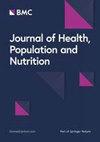中国 2-5 岁学龄前儿童饮食行为问卷的因子验证以及所评估的饮食行为与体重指数 Z 值之间的关系
IF 2.4
3区 医学
Q3 ENVIRONMENTAL SCIENCES
引用次数: 0
摘要
本研究旨在评估中国 2-5 岁学龄前儿童饮食行为问卷(CEBQ)的有效性和可靠性。此外,我们还调查了 CEBQ 评估的饮食行为与体重指数(BMI)之间的关联。我们对 2-5 岁中国学龄前儿童(n = 11780)进行了横断面研究。研究采用CEBQ对参与者的饮食行为进行评估,并对CEBQ进行了因子分析,同时考察了饮食行为的性别和年龄差异。通过控制年龄、性别、种族、母亲年龄、教育水平、种族和体重指数、父亲年龄、教育水平、种族和体重指数的线性回归分析,分析了儿童体重指数 z 分数与饮食行为之间的相关性。因子分析证实了 CEBQ 的八因子结构,解释了总方差的 67.57%。由于因子载荷较低,有两个项目被排除在外。各分量表显示出令人满意的内部信度(Cronbach's alpha 范围:0.76-0.90)。在 CEBQ 的几个分量表中观察到了显著的性别和年龄差异,并发现 BMI z 分数与各种饮食行为分量表相关。本研究结果支持CEBQ在评估中国学龄前儿童饮食行为方面的有效性和可靠性,而且儿童的饮食行为可能会受到年龄和性别的影响。此外,研究还发现体重指数与特定的饮食行为有关。了解这些关联可以为在这一人群中推广健康饮食习惯的干预措施提供参考。本文章由计算机程序翻译,如有差异,请以英文原文为准。
Factorial validation of the children’s eating behavior questionnaire and the association between the eating behaviors assessed and BMI Z score in Chinese preschoolers aged 2–5 years
This study aimed to evaluate the validity and reliability of the Children’s Eating Behavior Questionnaire (CEBQ) among Chinese preschool children aged 2–5 years. Additionally, we investigated the associations between eating behaviors assessed by the CEBQ and body mass index (BMI). A cross-sectional study was conducted with a sample of Chinese preschool children aged 2 to 5 years (n = 11,780). The CEBQ was employed to assess participants’ eating behaviors, and factor analysis of the CEBQ was conducted; sex and age differences in eating behaviors were examined. Correlations between children’s BMI z scores and eating behaviors were analyzed via linear regression analysis controlling for age; sex; ethnicity; maternal age, education level, ethnicity and BMI; paternal age, education level, ethnicity and BMI. The factor analysis confirmed the eight-factor structure of the CEBQ, which explained 67.57% of the total variance. Two items were excluded owing to low factor loadings. The subscales showed satisfactory internal reliability (Cronbach’s alpha range: 0.76–0.90). Significant sex and age differences were observed for several CEBQ subscales, and BMI z scores were found to be associated with various eating behavior subscales. This study’s findings support the validity and reliability of the CEBQ for assessing eating behaviors among Chinese preschool children, and children’s eating behaviors might be affected by age and sex. Furthermore, BMI was found to be associated with specific eating behaviors. Understanding these associations can inform interventions that promote healthy eating habits in this population.
求助全文
通过发布文献求助,成功后即可免费获取论文全文。
去求助
来源期刊

Journal of Health, Population, and Nutrition
医学-公共卫生、环境卫生与职业卫生
CiteScore
2.20
自引率
0.00%
发文量
49
审稿时长
6 months
期刊介绍:
Journal of Health, Population and Nutrition brings together research on all aspects of issues related to population, nutrition and health. The journal publishes articles across a broad range of topics including global health, maternal and child health, nutrition, common illnesses and determinants of population health.
 求助内容:
求助内容: 应助结果提醒方式:
应助结果提醒方式:


